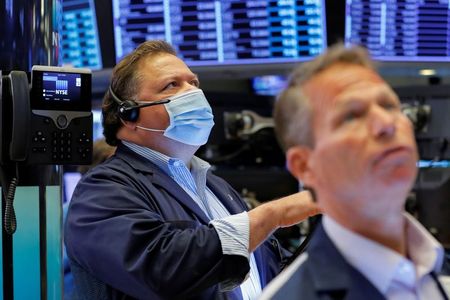By Lewis Krauskopf, Devik Jain and Ambar Warrick
(Reuters) – Wall Street’s main indexes slid on Tuesday, with the S&P 500 logging its biggest one-day percentage fall in about a month, weighed down by a drop in U.S. retail sales that raised concerns about the economic recovery, as well as by disappointing results from Home Depot.
Most of the S&P 500’s sectors finished lower, with consumer discretionary the weakest performer, falling 2.3%.
Home Depot shares fell 4.3% after the company’s U.S. same-store sales fell short of estimates for the first time in nearly two years as pandemic-fueled do-it-yourself projects tapered off. Shares of rival Lowe’s Companies dropped 5.8%.
A report showed that U.S. retail sales fell more than expected in July, as supply shortages depressed motor vehicle purchases and the boost to spending from the economy’s reopening and stimulus checks faded, suggesting a slowdown in growth early in the third quarter.
“The retail sales drop I think clarified for investors that COVID may well be a big problem going into the fall,” said Rick Meckler, partner at Cherry Lane Investments in New Vernon, New Jersey.
Prior to Tuesday’s drops, the S&P 500 and the Dow Jones Industrial Average had closed at record highs for five straight sessions.
“The (market) backdrop remains really solid,” said Katie Nixon, chief investment officer at Northern Trust Wealth Management. “At this point, when you have some of these negative macro indicators coming in and you have markets that are selling at all-time highs with pretty expensive valuations by any measure, there is just going to be more vulnerability to that kind of bad news.”
The Dow Jones Industrial Average fell 282.12 points, or 0.79%, to 35,343.28, the S&P 500 lost 31.63 points, or 0.71%, to 4,448.08 and the Nasdaq Composite dropped 137.58 points, or 0.93%, to 14,656.18.
The S&P 500 healthcare sector was a bright spot, ending up 1.1% on the day.
With the market in a period that has seasonally been weak historically, investors have said stocks may be due for a significant drop, with the S&P 500 yet to experience a 5% pullback this year. On Monday, the S&P 500 closed 100% above its March 2020 low.
Still, market watchers have said that huge amounts of cash held by investors and companies could protect stocks from severe declines, as buyers are quick to look for opportunities to scoop up cheaper shares. Indeed, the indexes ended well above their session lows on Tuesday as stocks partially recovered late in the day.
In an encouraging sign about the economic rebound, a Federal Reserve report showed production at U.S. factories surged in July.
Investors are looking for signs about when the Fed will rein in its easy money policies, with minutes from the central bank’s latest meeting due on Wednesday, and are watching the resurgence in COVID-19 cases and its impact on the economy.
In other company news, Walmart Inc shares ended little changed after the retailer increased its annual U.S. same-store sales forecast after beating analysts’ estimates.
Declining issues outnumbered advancing ones on the NYSE by a 2.92-to-1 ratio; on Nasdaq, a 2.51-to-1 ratio favored decliners.
The S&P 500 posted 39 new 52-week highs and 3 new lows; the Nasdaq Composite recorded 44 new highs and 318 new lows.
About 9.5 billion shares changed hands in U.S. exchanges, above the 9.2 billion daily average over the last 20 sessions.
(Reporting by Lewis Krauskopf in New York, Devik Jain and Ambar Warrick in Bengaluru; Editing by Maju Samuel and Aurora Ellis)





